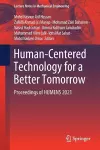
Human-Centered Technology for a Better Tomorrow
8 contributors - Paperback
£159.99
Dr. Mohd Hasnun Arif Hassan earned his first degree in Mechanical Engineering from the Technische Hochschule Bingen, Germany in 2010. During the final year of his undergraduate study, he was offered a scholarship by Universiti Malaysia Pahang (UMP) to pursue a Master’s degree in Mechanical Engineering at the University of Malaya in Kuala Lumpur, which he graduated with distinction in 2012. After that, he embarked on his PhD journey at UMP where he studied about the head injury sustained by soccer players due to heading manoeuvre. He completed his PhD study in 2016, then continued to serve UMP as a senior lecturer. His research interests include finite element modelling of the interaction between human and sports equipment, instrumentation of sports equipment, and injury prevention particularly with regards to sports and traffic accidents. His work aims to apply engineering principles in sports not only to enhance the performance of an athlete, but also to prevent injuries.
Dr. Mohd Nadzeri Omar received the B.Eng. (Hons) and Ph. D. degrees from RMIT University, Melbourne, Australia, in 2013 and 2017 respectively. He is a senior lecturer with the Faculty of Mechanical and Automotive Engineering Technology, Universiti Malaysia Pahang. He is also attached to the Human Engineering Research Group which focuses on research, development and innovations in human-centered technology and products. His research interests include soft tissue modelling, sports technology, biomechanical engineering and mechatronics.
Dr. Nasrul Hadi Johari obtained his PhD in Biofluid Mechanics from Imperial College London, United Kingdom. He is currently a senior lecturer at the Faculty of Mechanical and Automotive Engineering Technology, Universiti Malaysia Pahang. Dr. Johari’s research activities include computational modeling of blood flow, tissue mechanics and mass transport in the cardiovascular system, with applications ranging from evaluatingthe hemodynamic performance of medical devices to predict the outcome of endovascular interventional procedures. He is also interested in computational and experimental modeling of the interaction between human and sports equipment particularly in improving training aid systems and injury prevention.
Dr. Yongmin Zhong is currently an Associate Professor with the School of Aerospace, Mechanical and Manufacturing Engineering, RMIT University, Australia. His research interests include computational engineering, haptics, soft tissue modeling, surgical simulation, aerospace navigation and control, intelligent systems, and robotics.